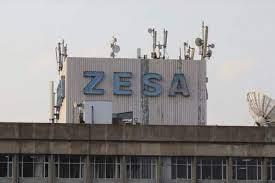News / National
Zesa unveils strategy to end load-shedding
25 Oct 2024 at 07:44hrs |
0 Views

ZESA Holdings has announced a transformative strategy to eliminate load-shedding by next year and achieve universal electricity access across Zimbabwe by 2030. The plan, detailed by ZESA executive chairman Dr. Sydney Gata in an interview with The Herald, focuses on local manufacturing, international partnerships, and streamlined operational efficiency.
This strategy is set to strengthen energy security, drive economic growth, improve living standards, and enhance infrastructure. Dr. Gata emphasized that aligning with government policies is central to the plan, which includes rebundling ZESA's subsidiaries to improve cohesion in energy management and distribution.
"With the measures we've taken, we now have positive investments across the energy sector. Our goal is to shift the energy supply burden from government to competent large-scale consumers, such as mining companies, who can invest in their own power sources," Dr. Gata said. This shift mirrors a successful government policy in the fuel sector, where private importation eased demand pressures.
The phased strategy includes ambitious milestones, starting with clearing the backlog of electricity connections by 2026. Dr. Gata shared the roadmap: "In 2027, we aim to end power imports and become a net exporter by 2028. By 2029, we target world-class energy standards, and in 2030, we intend to achieve universal access."
Investment in infrastructure is key to achieving these targets. Dr. Gata announced that six new captive power plants, with a combined output of over 1,000 MW, are set to start within the month. Additionally, nine new power stations will break ground, expected to add 2,690 MW—nearly doubling Zimbabwe's current dependable capacity.
Dr. Gata also credited President Mnangagwa's strategic leadership in driving ZESA's progress and praised the decision to internalize production of critical hardware. ZESA Enterprises, in collaboration with a UAE-based firm, will manufacture cables and conductors locally, replacing aging infrastructure, including 24,000 kilometers of deteriorated underground cables.
While Dr. Gata pointed to aging infrastructure and the impact of sanctions on ZESA's financing capabilities, he underscored the country's challenges with fluctuating Kariba dam hydrology, which has drastically cut its generation capacity from 1,050 MW to just 150 MW. Hwange Power Station's age-related limitations also compound the supply issues.
"This plan is a long-term investment for Zimbabwe's future, ensuring reliable, locally controlled energy that benefits generations to come," Dr. Gata concluded.
This strategy is set to strengthen energy security, drive economic growth, improve living standards, and enhance infrastructure. Dr. Gata emphasized that aligning with government policies is central to the plan, which includes rebundling ZESA's subsidiaries to improve cohesion in energy management and distribution.
"With the measures we've taken, we now have positive investments across the energy sector. Our goal is to shift the energy supply burden from government to competent large-scale consumers, such as mining companies, who can invest in their own power sources," Dr. Gata said. This shift mirrors a successful government policy in the fuel sector, where private importation eased demand pressures.
The phased strategy includes ambitious milestones, starting with clearing the backlog of electricity connections by 2026. Dr. Gata shared the roadmap: "In 2027, we aim to end power imports and become a net exporter by 2028. By 2029, we target world-class energy standards, and in 2030, we intend to achieve universal access."
Investment in infrastructure is key to achieving these targets. Dr. Gata announced that six new captive power plants, with a combined output of over 1,000 MW, are set to start within the month. Additionally, nine new power stations will break ground, expected to add 2,690 MW—nearly doubling Zimbabwe's current dependable capacity.
Dr. Gata also credited President Mnangagwa's strategic leadership in driving ZESA's progress and praised the decision to internalize production of critical hardware. ZESA Enterprises, in collaboration with a UAE-based firm, will manufacture cables and conductors locally, replacing aging infrastructure, including 24,000 kilometers of deteriorated underground cables.
While Dr. Gata pointed to aging infrastructure and the impact of sanctions on ZESA's financing capabilities, he underscored the country's challenges with fluctuating Kariba dam hydrology, which has drastically cut its generation capacity from 1,050 MW to just 150 MW. Hwange Power Station's age-related limitations also compound the supply issues.
"This plan is a long-term investment for Zimbabwe's future, ensuring reliable, locally controlled energy that benefits generations to come," Dr. Gata concluded.
Source - The Herald
Join the discussion
Loading comments…


































